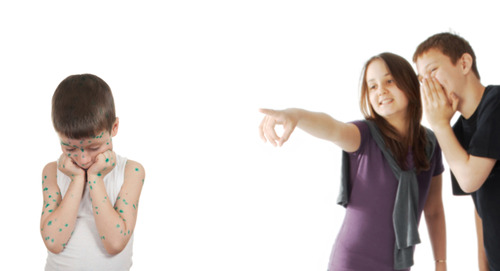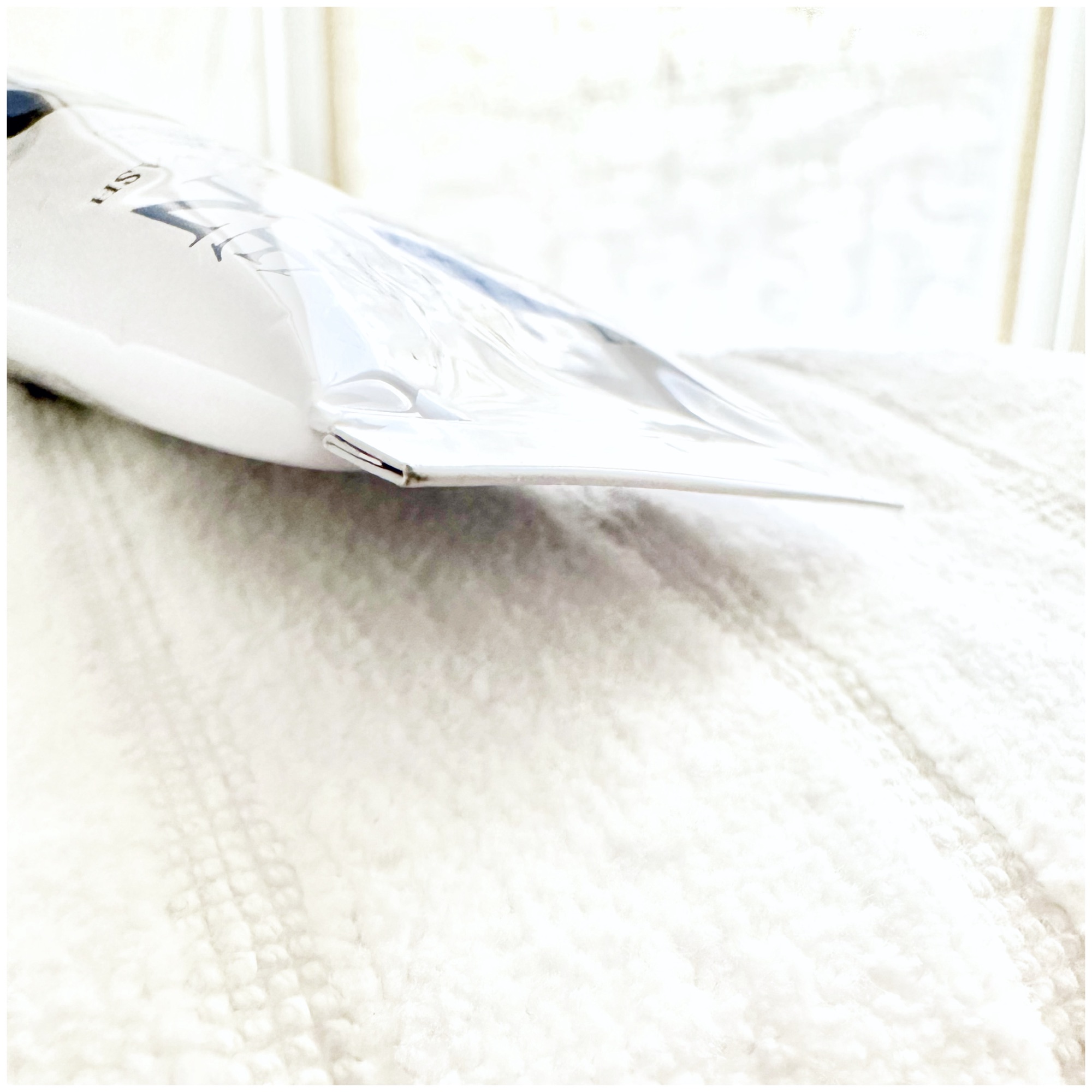Bullied because of your skin?
You’re not alone. Obvious skin conditions can make one a target of bullying. In her excellent review of current literature about psoriasis, mental health and quality of life, Tara Fletcher writes:
“School years are often filled with self-consciousness, trying to fit in with the popular crowd, a desire to appear ‘cool’ and to form relationships. It is therefore understandable that a visual condition of the skin is going to be a target for bullies. It is common knowledge that bullies tend to target individuals who possess a feature or quality that is different from the norm. As psoriasis is a rare condition and its appearance is visually unappealing, it seems logical to conclude that children with psoriasis are subject to teasing and/or bullying by their classmates.”
I was bullied as a kid myself and when I think of my teenage years, acne looms as a central, terrifying figure. My exclusion was partly because I was “weird’ and didn’t quite fit in and, being of mixed race, I looked a tad “off”. But I also had a pretty famous dermatologist for a mother and pretty bad acne — not a good combination. It got so bad that I would lie about who my mother was, saying that the dermatologist of that name was a distant relative and that my own mom was a neurosurgeon. I found that this helped avoid the incredulous eyes roving over my bumpy skin. The fact that my mother was a skin doctor seemed to be an invitation to a) PLEASE, LOOK AT MY AWFUL SKIN BRAZENLY, TRULY, I DON’T MIND, and b) wonder — not always silently — why my mom hadn’t fixed my spotted complexion.
Like acne, eczema and psoriasis are immediately visible skin conditions that can attract negative attention, and sometimes, bullying. In an interview with Everydayhealth.com, director of pediatric dermatology at Miami Children’s Hospital, Ana M. Duarte, M.D. says, “Anything visible on skin will cause kids to be picked on,“ she says. “We deal with it all the time.”
Bullying specifically among those with acne, eczema and psoriasis was the subject of a study published in the Scandinavian Journal of Caring Sciences.
“Acne, psoriasis and atopic eczema are common diseases and have been consistently associated with adverse psychological sequelae including stigmatization. Being teased on the basis of appearance has been associated with psychiatric morbidity in children and adolescents…For those who had suffered teasing or bullying, this was causally linked in respondents’ accounts with psychological sequelae, especially self-consciousness and effects on self-image and self-esteem.”
PSORIASIS AND BULLYING
Highlighting a survey conducted by the National Psoriasis Foundation, psoriasis.org shares that:
“During the past six months, nearly half (44 percent) of the children surveyed had been bullied at least once or twice. Of those bullied:
- 83.3 percent were teased.
- 44.4 percent were excluded or left out.
- 27.8 percent were called names.
- 22.2 percent were threatened or intimidated.
- 17.2 percent were hit, pushed or kicked.
Thirty-eight percent (38 percent) of respondents who were bullied said the abuse was a direct result of his/her psoriasis or psoriatic arthritis.”
The bullying isn’t limited to children. In 2010 in the Philippines, Rev. Magnolia Mendoza was prevented by airline crew from boarding a plane because of lesions on her face. Many of my mother’s patients report being stared at by co-workers. Some have been shunned so severely, particularly during flare-ups, that they have felt the need to quit working or to try to look for a more compassionate environment. Stress is very closely linked to psoriasis (more on this below) and a hostile workplace can prolong or worsen flare-ups.
So prevalent is bullying and ignorance of the disease that many doctors, such as my mother, consider support groups as standard in the management of psoriasis. She presented a study at an international medical gathering on psoriasis in Stockholm about the percentage of suicidal thoughts (ideation) and attempts among psoriasis patients. The study was not linked to bullying but underscores how stressful a condition psoriasis can be, with suicide ideation peaking at 14% in her study and ranging from 3.2-8.6% in other studies. In The Psychosocial Burden of Psoriasis, Fletcher reports that “Compared to the other dermatology groups studies (acne patients, alopecia [hair loss], and atopic dermatitis [a type of eczema]), psoriasis inpatients with 52% (plus or minus 23.4%) of their skin affected had the highest depression scores.”
ECZEMA AND BULLYING
“Eczema Patients Face A Lifetime Of Isolation, Bullying And Discrimination,” MedicalNewsToday.com shares the results of an international survey of 2,000 patients with moderate to severe eczema.
“No less than 27% of patients have been bullied or teased because of their eczema, while around 10% of adult patients believe they have suffered discrimination at work including being stared at, not being accepted or having comments made behind their back, with many outsiders wrongly assuming that the condition is contagious. Furthermore, one in seven adult patients believe their career progression has been hindered by eczema, with the disease affecting job interviews and restricting their choice of careers.”
When asked what would be the single most important improvement to their quality of life, 75% answered “being able to control their eczema effectively.” Not surprisingly, many respondents cited eczema as holding them back from making friends or having relationships. And “even in established relationships many couples have problems caused by eczema, with 43% of adult patients feeling awkward about a partner touching or seeing their body when their symptoms flare up. A similar number of patients are concerned about being seen in public during a flare-up.”
The impact on children can be even stronger as they often struggle with issues of identity and difference. Even well-intentioned gestures can mark an already self-conscious child. In one case, a school’s policy against touching prevented a teacher from applying eczema medication to a 5-year-old’s back. The school’s intentions were arguably good (the policy is in place to prevent inappropriate contact). But it did emphasize this child’s difference. And anyone who remembers school — despite countless PSAs and “Glee” episodes — might recall that “different” is frequently the one thing you don’t want to be as a child.
BULLYING TODAY
A few of us reading this might think, we were all bullied at one point or another and most of us get over it. This is true, too: most of us do. But some of us don’t. And the “some” matters. As my mother’s study on suicidal ideation among those with psoriasis shows, the depression and anxiety can turn serious. In 2010, a 13-year-old boy who had been “targeted since he was at nursery as a result of his eczema, and had told a counsellor he had thought about killing himself” hanged himself.
Found on Soul Pancake’s current special on mental health and further underscoring the relationship between inner pain and skin (I personally don’t believe that the phrase “comfortable in one’s own skin” is accidental), “My Life Continued Because Love Is Louder” Sarah Virginia Sparkes shares how her inner struggles led to her cutting herself. She names the resulting scars as one of the things she’d “had enough of” when she decided to take her own life.
“It was a Monday in early January when I decided I’d had enough. I’d had enough of how uncomfortable I felt in my own skin and the constant stress over my weight. I’d had enough of my five-year struggle with anorexia, depression and the scars on my skin from cutting myself since I was 12. I didn’t want to spend another day trapped in an eating disorder, and suicide seemed like my escape.”
Depression and suicide are complex realities and a skin condition or bullying alone, or even combined, may or may not be enough to cause severe depression or suicidal thoughts. Still, certain visible skin conditions have a history of causing anxiety, as does bullying, and these can be contributive to a miserable reality. With suicide one of the top causes of death among young people aged 15-24, depression or mental illness in a young person should be taken seriously.
What might be an exacerbating factor is technology and social media. When I was on the receiving end of meanness, people had to be mean to my face; there is a level of bravery that’s required to do that. Contrary to how it may seem to the victim at the time, being mean isn’t necessarily easy. It takes adrenalin, a decision to put empathy on hold in the face of visible hurt, and the willingness to back it up should the target retaliate. Meanness behind a keyboard changes a few things. First, it defuses the situation — it makes the interaction far more impersonal. You don’t see the pain on the other person’s face, or the angry or shocked reactions from other people; others can’t see your own fear, indecision or awkwardness; and you cannot be hurt back physically (I’m not condoning violence, but the potential of being hit when being mean to someone is a real deterrent). Second, photos meant to be mean can circulate in nanoseconds. Not so before the age of social media. Bullying took more time, spread less quickly, and was unlikely to go global. Which brings us to the third: social media seems to be able to rapidly breed mob mentality. On social, single instances of bullying can quickly become a (sometimes massive) “campaign” against a person.
My personal belief is that kids are naturally empathetic but experiment with meanness as a part of their learning how (and where) to fit in. In person, when I was growing up, this was a more complex human interaction than when done anonymously, rapidly and, potentially globally, through social media.
Certain skin conditions are stressful. They can make one a target for bullying. And bullying today isn’t what it used to be. Having been a kid with bad skin problems, I can’t tell you how grateful I am that I grew up before the internet exploded.
STRESS, ANXIETIES AND FLARE-UPS: VICIOUS CYCLE
So, your skin makes you feel bad because not only is it not Photoshop-perfect, it’s unmistakably flawed: scaling, peeling or oozing, and/or red and/or bumpy and/or dotted with infected matter. Visibly so. Unavoidably so. And right where everyone looks at you: in your face. Barring a ski mask (and possibly a wetsuit), there’s simply no way to hide it…it is neon-sign-level out there, front and center, exactly where people have to look at you the most.
In addition to the insecurity of your flaws being so vividly on display, they may (particularly in severe cases of eczema) also be physically, chronically, and sleepless-night-level, scratch-till-you-bleed uncomfortable.
Add to all that the fact that your skin has now attracted the wrong kind of attention and you’re bullied. Here comes the nefarious icing on this vicious cake: the stress and anxiety you’re feeling could be making your skin condition worse.
Eczema, psoriasis and acne are inflammatory diseases and inflammation is closely linked to stress. All the complex emotions resulting from insecurities, discomfort and bullying could be causing more flare-ups or acne, and make successful treatment even harder.
In “Psoriasis and Bullying: Breaking the Cycle,” Inge Sengelmann, a psychotherapist interviewed for the piece, says “bullying can worsen psoriasis and create a vicious cycle…
…Psoriasis is exacerbated by stress,” she says. “If a kid with psoriasis is bullied, it can make the condition much harder to treat, which can make the bullying worse.”
This is why clear skin isn’t necessarily about narcissism. Successfully managing a visibly “other-ing” skin condition can be life changing. In the same article, Dr. Bruce Strober, MD, PhD, from the University of Connecticut in Farmington, emphasizes that clearing the skin should not be underestimated: “Psoriasis damages a kid’s self-confidence, but treating it will change a child’s life for the better…(when the doctor) first meets a child or teen with psoriasis, he or she is usually quiet and stays in the background. After the skin clears up, a different child often emerges.”
”Normalizing these kids is the most gratifying experience I have as a physician,” Dr. Strober is quoted as saying in the article. I can tell you that this is something we feel very deeply and directly at VMV. Many of our clients are the most severe cases — the worst allergies, eczema, acne, psoriasis. One was afraid to leave the house. Another couldn’t wash her hair in 20 years. Yet another had a baby who’s eczema was so bad she couldn’t sleep (and therefore no one did) for years. Countless more share with us their feelings of insecurity, frustration or sadness. I used to hide behind lots of hair trying to cover up my face (which, of course made my acne worse) and developed tremendously low self esteem. My life changed when my skin cleared — much like Dr. Strober observed, a different me emerged. And I can’t tell you how rewarding it is to know that we make such a difference for others with similar difficulties. Providing effective care for other skin issues and gorgeous makeup that’s still safe is pretty awesome (and fun :)…but the life-altering help that we can contribute when caring for the most severe cases? This is why we get up in the morning.
I used to say I came back from a career in academia because my father fell ill and my mother asked me to help run the company. Remembering what I went through as an ostracized child and how insecure I felt about my skin — and seeing how often and how dramatically we’re able to help people now — this stopped being a job a long time ago. It’s a way to pay it forward, to provide comfort and clarity to those who need it most, and to contribute to goodness to the world.
Laura
VMV HYPOALLERGENICS® CEO
Instagram/LauraAtVMV
REFERENCES:
- http://www.everydayhealth.com/psoriasis/psoriasis-and-bullying-breaking-the-cycle.aspx
- Magin, P., Adams, J., Heading, G., Pond, D., & Smith, W. (2008). Experiences of appearance‐related teasing and bullying in skin diseases and their psychological sequelae: results of a qualitative study. Scandinavian journal of caring sciences, 22(3), 430-436
- http://www.psoriasis.org/parents/support-your-child/get-involved/bullying
- http://www.prnewswire.com/news-releases/nearly-half-of-kids-with-psoriasis-surveyed-report-being-bullied-105718773.html
- http://www.papaa.org/articles/psychosocial-burden-psoriasis
- http://www.medicalnewstoday.com/releases/16646.php
- http://www.dailymail.co.uk/news/article-2107154/Teachers-refuse-help-year-old-girl-rub-eczema-cream-child-protection-fears.html
- http://www.dailymail.co.uk/news/article-1329175/Boy-13-hanged-taunted-painful-skin-condition-school-bullies.html
- http://www.huffingtonpost.com/sarah-virginia-sparkes/my-lifecontinued_b_4080414.html
- http://gawker.com/louis-c-k-s-explanation-of-why-he-hates-smartphones-is-1354954625
- Inflammation in the pathogenesis of chronic diseases. Harris RE Ed. 2007 Springer, USA
- Gottlieb AB, Dann F. Comorbidities in patients with psoriasis. Am J Med. 2009 Dec;122(12):1150.e1-9.
- Jeremy AHT, Holland DB, …Cunliffe WJ. Inflammatory Events Are Involved in Acne Lesion InitiationJournal of Investigative Dermatology (2003) 121, 20– 27
- Zouboulis CC, Eady A, Philpott M, Goldsmith LA, Orfanos C, Cunliffe WC, Rosenfield R. What is the pathogenesis of acne? Exp Dermatol 2005: 14: 143–152
Laura is the CEO of VMV Hypoallergenics and eldest daughter of our founding dermatologist-dermatopathologist. She has two children, Madison and Gavin, and works at VMV with her sister and husband (Madison and Gavin frequently volunteer their “usage testing” services). In addition to saving the world’s skin, Laura is passionate about learning, literature, art, health, science, inclusion, cultural theory, human rights, happiness and goodness.








